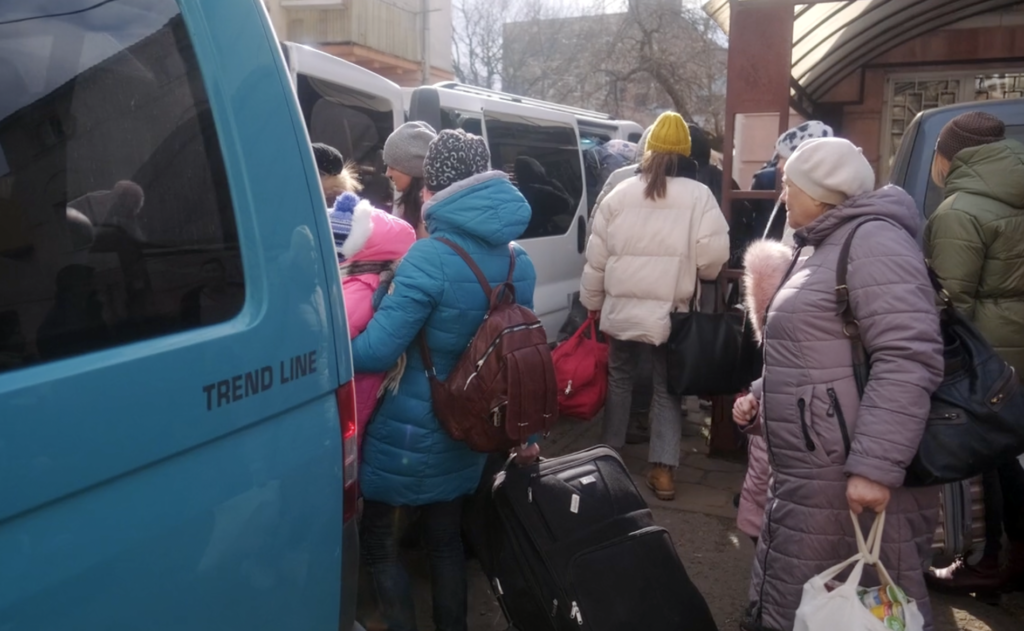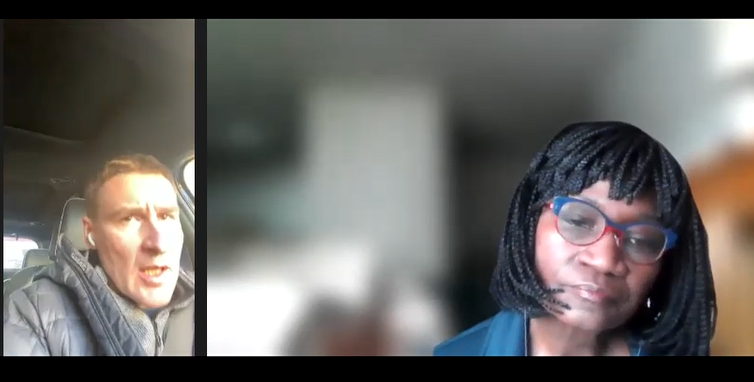
LVIV, Ukraine (BP) – With Russian air raids now just 100 miles northeast of Ukraine Baptist Theological Seminary in Lviv, president Yaroslav “Slavik” Pyzh is challenged to live in a state of emergency as the new normal.
The Southwestern Baptist Theological Seminary alumnus spoke with Baptist Press via Zoom March 11 while driving in Lviv, navigating checkpoints and heavy traffic as the war zone expands into western Ukraine.

“For the last two weeks, we’ve been in a state of emergency. This state of emergency is our new normal,” Pyzh said. “Now we need to learn how to live in that state of emergency, but not kind of reacting to it, but responding to it.
“That’s the biggest shift in attitude, because you cannot handle long enough if you’re going to be living in a state of emergency reacting to it. We need to learn how to respond to it and start just living, because nobody is living. Everybody is reacting to what is happening.”
Ukraine Baptist Theological Seminary (UBTS), at its Lviv headquarters and other sites, has helped about 8,000 refugees flee the war zone since Russia invaded Ukraine Feb. 24, Pyzh said. About 70 staff members and volunteers are distributing food and clothing, providing beds and transportation, leading daily devotions and offering counseling, working nearly nonstop.
“So we need to start eating. We need to start sleeping. We need to start resting. We need to start living. And I think this is, we have several things that do not allow you to live,” Pyzh said. “The first thing is you see the rest of the country being bombed, so you sort of, you have this shame feeling that you cannot live, you cannot enjoy life, because everyone else is crying and dying and everything else.
“But sadly, this reality is not going to end tomorrow. It’s not a matter of weeks. It’s a matter of months and maybe a year or so.”

Pyzh planned to meet with Southern Baptist Send Relief workers hours after his interview with Baptist Press to discuss humanitarian aid. While UBTS has been able to help many in need, he finds the magnitude of the need difficult to assess.
“The need is growing every day, with more advances, with more killing and destruction, the need is becoming greater and greater,” he said. “Even if war stops now, then we still will have needs” helping people resettle and return home. UBTS is expanding its outreach to distribute medicine, food, hygiene items and other necessities.
“We’re working together with Southern Baptists like Send Relief agency. So they are thinking about allocating some funds for us to purchase some of these needs in order to help people,” he said. “I’ll be having a meeting tonight, so we probably will buy like a truckload of food for children (and) first aid kits that are very needed for our soldiers and civilians.
“I’m glad that there is such a country as United States,” he said, thanking Southern Baptists in particular for their support. “If it were not for the United States, we would be having a real hard time here in Ukraine. We still need that miracle (for the war to end) and I still ask every single person I talk to to pray for a miracle, but I see that miracle unfolding every day.”
Amid the distress and danger, Pyzh has witnessed a hunger among refugees for relief and rest. UBTS responds with practical help and the Gospel.
“That is actually very effective,” he said. “Everyone is willing to listen. Everyone is willing to be prayed for. Under war, nobody is refusing” outreach, including daily devotions, counseling and prayer. “Everybody is happy to do that. Everyone is … looking for a glimpse of hope.”
He spoke of a refugee who traveled 30 hours from Kharkiv in eastern Ukraine to reach UBTS.
“When she came to Lviv to our seminary, that was the first time that she was crying,” Pyzh said. “She said, ‘I couldn’t cry before, because I was afraid of bombs exploding and killings and everything else.’ That’s kind of the need people have.”
Refugees arriving at UBTS peaked three days ago at about 400 people a day, mostly from Kyiv and Kharkiv, before subsiding, Pyzh said, but he expects numbers to increase.
“We expect it to pick up in the next couple of days because the war is kind of expanding geographically,” he said, “so I think people will be coming from other parts of Ukraine.”
About 2.5 million people have fled the country, the United Nations said, with another 2 million internally displaced. The U.N. has recorded 549 civilian deaths and 957 injuries in Ukraine since Russia launched its invasion, U.N. High Commissioner for Human Rights spokesperson Liz Throssell said in a March 11 press briefing from Geneva, indicating the actual number of causalities and injuries could be “much higher.”
“Civilians are being killed and maimed in what appear to be indiscriminate attacks, with Russian forces using explosive weapons with wide area effects in or near populated areas,” Throssell said. “These include missiles, heavy artillery shells and rockets, as well as airstrikes.”
Russia struck military airfields in Lutsk and Ivano-Frankivsk March 10, ABC News reported, striking targets as close as 85 miles from Lviv.
Despite the war, Pyzh has no plans to end relief operations and flee to Poland, but will rather expand relief efforts to reach refugees from Ukraine in Poland.
“The thing is I really believe, and I don’t have doubts, we will win,” he said. “So to say I have escape plan? No, I don’t have escape plan. I have expansion plan. So we will expand.
“Another thing I know for sure, we’re not going to be the same seminary we used to be. Something will change. And something drastic will change, because the situation is different and will be different. I don’t think we will be a classical seminary. I think we will emphasize the role of the church in society, raising people with spiritual values and things like that. But we’re not going to be training church people for church.”
For videos about the work going on at UBTS, go here.
To donate to Southern Baptist relief efforts, go here.

















